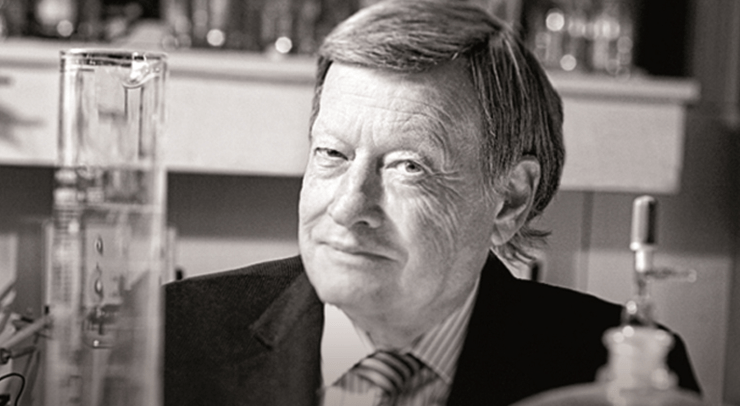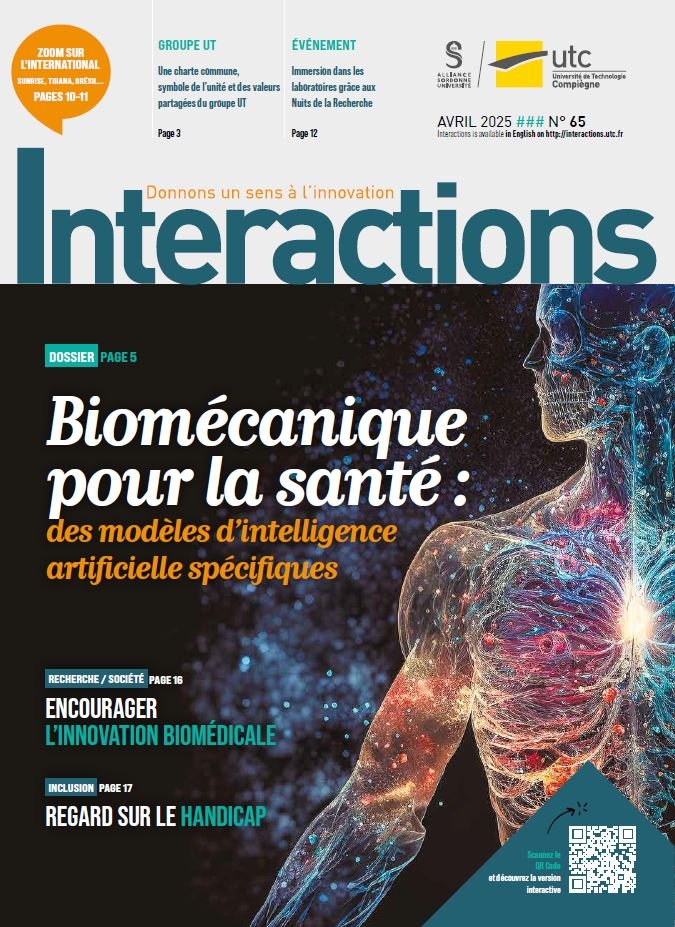Daniel Thomas, UTC Pioneer

Professeur des universités, dès 1979, Daniel Thomas est entré à l’UTC le 1er mai 1974. Sa carrière reste inséparable de la réussite de l’UTC à laquelle il contribua de manière exceptionnelle. L’UTC perd l’une de ses plus hautes personnalités dans le rayonnement scientifique international sur les biotechnologies dont il est à l’initiative. Ses qualités humaines resteront à jamais gravées dans nos mémoires. Voici les premiers hommages que nous avons reçus de la part, entre autres, de certains de ses amis de longue date. Nous continuerons à publier ces hommages dans les pages d’Interactions, en mémoire du grand homme qu’était Daniel Thomas.
Professor Daniel Thomas, a truly marvellous scientist and for me a great friend, left us bereaved. I also measure the loss for UTC, for France and for Europe inasmuch as he was one of the world leaders in biotechnologies, in particular in enzyme engineering.
Daniel was a great scientist, who possessed an acute sense for creativity. As a professor, he made some early capital discoveries that enhanced UTC’s world-class position in his fields – he was the University’s Vice-President when he deceased. He and I enjoyed a very creative relationship, both on the personal and professional levels. Today, for example, one of my most talented PhD students, Dr Karsten Hapt, today Professor at UTC, came from this school. Today he is a brilliant pioneer in biotechnologies especially in molecular printing processes. Well-known by scientists and entrepreneurs round the world, Professor Daniel Thomas had that fantastic capacity to set up new contacts between companies and research establishments. Daniel Thomas also worked hard to organise scientific meetings and I personally recall one such international conference held in Compiegne, which ended on a magnificent reception at Versailles. I should also mention that I was awarded an Honoris Causa doctoral degree at the hands of President Prof. Alain Storck and by Bernard Beigner, Rector of the Academy of Amiens. This was a great honour for me, 10 years after the famous Professor Marc Van Montagu, co-laureate of the 1998 Japan Prize (1998).
Professor Daniel Thomas was a wonderful, outstanding person, open-minded, positive-thinking and who possessed, moreover, a fantastic memory. I recall as if it was yesterday an incident that took place when we at the University of Lund in Sweden had invited Daniel Thomas to join a thesis jury. I must underline that defending a thesis is a highly respected process in Sweden and I try to invite the very best opponents to the event, as if it was a Nobel Prize deliberation. When it was Daniel Thomas’ turn to speak – the jury sitting behind a table, facing the PhD candidate, with some hundred persons also present in the room, I noted he did not have the thesis open (running between 100 and 200 pages) and he began “On page 38, you miswrote a scientific formula …”
The jury and guests were staggered by his memory of the facts and figures. I could write a book about you, Daniel, but I hope these few lines will convey how much my feeling for you were strong. Science has lost a great man, far too early.
Mosbach Emeritus professor Klaus Lund University, Sweden
A builder at heart
In all my career, I think I have rarely met anyone as dynamic and forward-thinking. I met Daniel Thomas in 1972, when I was finishing my own PhD thesis, and Daniel was a young research scientists engaged by the Charles Nicolle Hospital in Rouen. Even in those days his enthusiasm was communicative and his research work held the rich promise of things to come.
The year before, my colleague René Lefever had met with Daniel Thomas during a science school in Aussois and he had immediately identified the high interest in Daniel’s work when he began to immobilize enzymes. Consequently, he invited Daniel to come to the Free University of Brussels (ULB) at a conference where he met Professor Ilya Prigogine (Nobel Prize for Chemistry, 1977). Daniel’s research at the time related to the bi-stability of membranes with embedded enzymes and to Prigogine’s work on auto-organization and dissipative structures. Daniel’s work led to a publication in Nature in 1974, with the title “Memory in enzyme membranes”. In the early 1980s, Ilya Prigogine organized a meeting between Daniel Thomas and Jacques Solvay, Chairman of the Solvay Company with whom Daniel collaborated on this question of immobilized enzymes. Following this, Daniel came frequently to ULB where he was appointed Professor to the Solvay Chair of Chemistry (1982–1983). He was able to give a 2 hour lecture without a single note and that really impressed us a lot! At UTC, he built up a team of keen, dynamic, young research scientists and he lent his strong impetus to their work.
Following my first meeting with Daniel Thomas, in the framework of my own PhD work, I had begun an annex thesis on a subject that he was studying is his own laboratory at that time. I went to see him several times in Rouen and then at UTC where he was appointed when it began – with him, I recall was his mathematician friend Jean-Pierre Kernevez, who died unfortunately and far too soon. Both men were close to each other: Daniel had understood long before others ion the scientific community the potential of modelling life function in biology and the complementarity between experimental and theoretical work. I saw Daniel Thomas many times over the following years. When I did a post-doc at the Weizmann Institute, in Israel, in 1973–1975, we were working (all three of us) with René Lefever, on an article that was never in fact published. Daniel had somehow forgotten our manuscript in a desk drawer and the final editing touches were never made! The reason was simple enough: already Daniel had many dossiers moving forward in parallel and he never stopped. A true visionary, a creative, a builder at heart!
But then our ways parted, with different research interests – myself concentrating on modelling life biological rhythms and Daniel on more biotechnological affairs. I held him in highest esteem. He indeed contacted me several year ago to join a meeting of UTC’s Science Advisory Committee and I was so sorry to have to turn down the invitation, for sheer lack of time and the meeting would have given me the opportunity (and the pleasure) to see him once more. I shall always recall his penetrating, laughing almost bawdy eyes, bordering on the malicious. Thus I was not unduly surprised at learning the scope of his research activities and the applications in the biotechnological sectors. Here was a man of exception, whose memory will remain engraved in my heart and mind
Professor Albert Goldbeter Chair of Theoretical Chronobiology Faculty of Science Free University, Brussels
The link between academic and industrial spheres
Daniel Thomas and I met in 1981 at a conference in Tokyo. As a pioneer in GMOs, I explained all that I thought possible to create from plant sources and he immediately realized the prime contribution that life sciences could offer for the future of our societies, whereas he was a PhD in Physics.
Often scientists like to present themselves as leaders in their basic research field of specialties, with no concern as to possible applications of their work. But Daniel Thomas, with his functions at UTC and also at the National Academy for Technologies of France (NATF) felt that it was his duty to inform of progress made in the laboratories those where he saw a promising outlet. He was the anchor-man between the academics and the industrialists in biotechnologies, even if basically he was a lecturer and a research scientist above all else. He was endowed with a marvellous intelligence and charmed everyone. He was at ease when communicating with any specialists, no matter the subject, and this alone enabled him to move scientific boundaries forward and with them the applications in many areas. He was an honest man, able to build a vast network of faithful friends and others who listened to him, to advance themselves.
At the end of the 1990s the ecology groups decided to condemn GMOs via ideological slogans with no scientific base; this was a difficult period for Daniel Thomas. No politician at the time – especially in France – had the courage to defend a scientifically sound point of view, and this led to a halt of research in the GM fields. But Daniel Thomas was made of sterner stuff and that was his great merit. He reoriented his work to fermentation and use of organic wastes as possible energy sources. This bio-sourced energy has a promising future ahead in France, if the country wishes to exit nuclear power production and does not wish to exploit shale gas sites. Green carbon (in plants and organic wastes) can replace fossil carbon and thanks to Daniel’s foresight, UTC is in an excellent position here. He also worked on the development of catalysing proteins capable of producing future raw materials with abundant bio-sourced components for the plastic industry sector, to replace petroleum by-products. Unfortunately the world of research does not have sufficient means to move ahead as fast as the demographic challenges and climate change. Life itself is too short: Daniel Thomas left us at the age of 68 while I am here at 81 and I still see myself as a young debutant.




